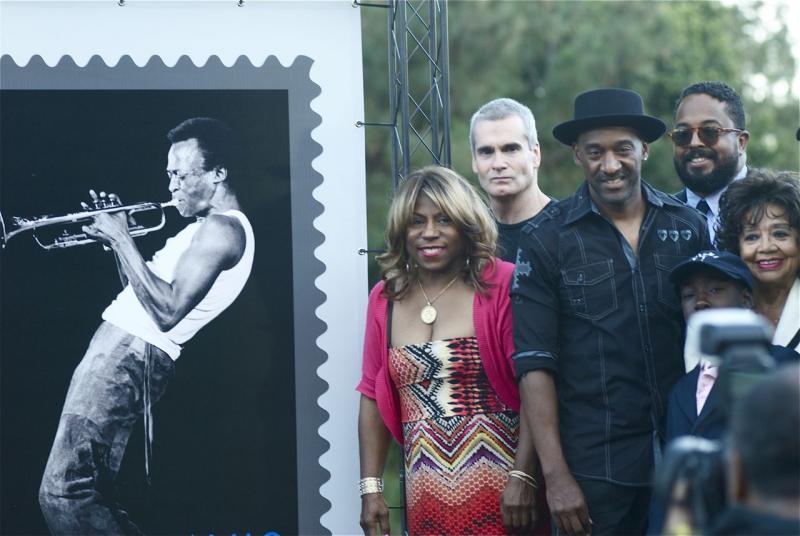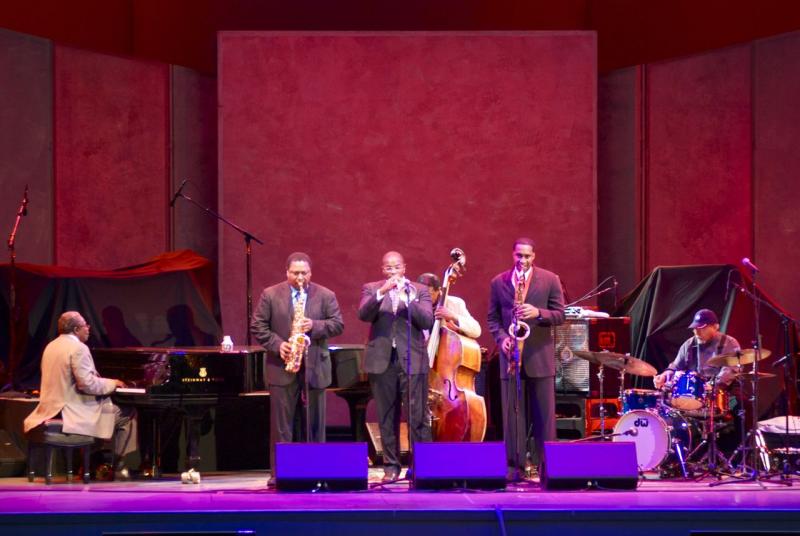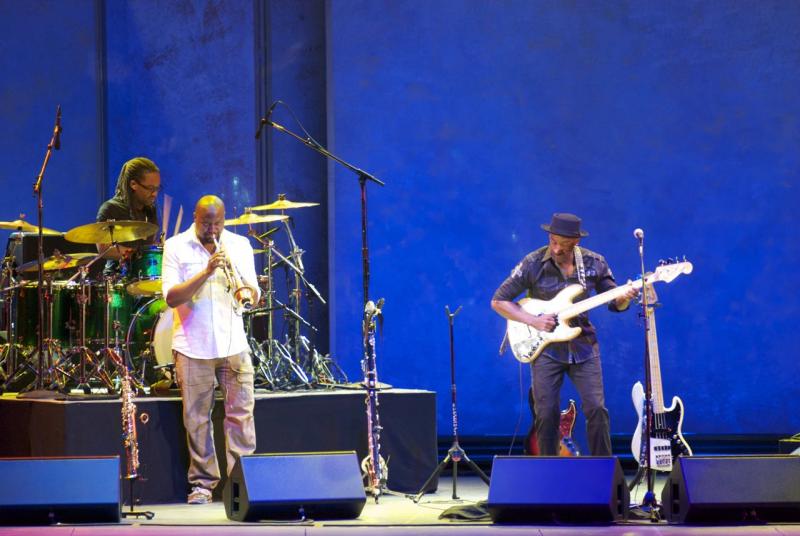Home » Jazz Articles » Live Review » Miles In The Hollywood Sky
Miles In The Hollywood Sky

Hollywood Bowl
Los Angeles, CA
June 27, 2012
Let's face it, change messes people up. Dealing with change demands an openness of spirit and thought, a willingness to learn and an ability to improvise. That's too much, Daddy-O. The average human prefers the routine to the spontaneous, the familiar to the unknown. They like a melody they can hum and, when they attend concerts, they expect the musicians to perform their most popular songs with no variation. These are the kinds of people whom trumpeter Miles Davis could mess up most. And he did.
Some inner force drove Miles Davis to a life of constant change. He changed his clothing styles, his hair styles, his women and, most importantly, he changed his music. To paraphrase the 19th century's leading exponent of individuality, Ralph Waldo Emerson, Miles Davis lived his life by following the restless beat of his own heart not by conforming to the desires of others. So, after several luminescent years playing sizzling bebop with saxophonist Charlie Parker, Davis started playin' cool jazz. Later, the chameleon-like trumpeter changed again, adopting a modal style of music on Milestones (Columbia, 1958), an approach he favored because, among other things, " you can go on forever. You don't have to worry about changes and shit," as he told author Quincy Troupe in Miles the Autobiography (Touchstone Books, 1990).
For most critics, as well as many of his older fans, his "electric" period, beginning in the late 1960s, likely proved to be the most unsettling of his many mutations. Since 1964, Davis had been leading his second great quintet, with pianist Herbie Hancock, saxophonist Wayne Shorter, bassist Ron Carter and drummer Tony Williams, who would all go on to lead the jazz scene for the next 50 years. Most jazz lovers and critics alike would likely have been satisfied had Davis continued to play "On Green Dolphin Street" with these musicians until his last note on Earth.
But music for Davis was never about making people happy; it was about following his Muse, wherever she would take him. It took him to In A Silent Way (Columbia, 1969) and Bitches Brew (Columbia, 1970). And, to the very end, Davis continued his quest to make new music.
This seemingly inexhaustible reservoir of creativity was recognized on June 27, 2012 in Los Angeles, with a tribute at the Hollywood Bowl that began with a formal dedication of a new Miles Davis postage stamp. Officials from the US Post Office, former Davis band mates Hancock and bassist Marcus Miller, and rocker and music writer, Henry Rollins, all spoke eloquently of Davis' unending search for his own "sound" and the musical impact of his journey on the rest of the music world.
And then there was the music.
The last living member of Davis' 1958 band, the great octogenarian drummer Jimmy Cobb, and his aptly named So What Band, opened up the evening's chronologically arranged program by performing the entire Kind Of Blue ( Columbia, 1959), the best-selling recording in jazz history. The instantly recognizable (at least to the hipsters) opening notes of the tune, "So What," this time played by veteran New York pianist Larry Willis and bassist extraordinaire, Buster Williams, triggered the audience's collective foot-tappin' reaction. Cobb established the steady beat as he had more than 50 years ago and the horn section blew strong and hip.

Jeremy Pelt, his trumpet appropriately muted, gave the audience its first taste of brass. Pelt plays with a much brighter tone, but the first note, no doubt, brought thoughts and memories of Davis to mind's eye. Altoist Vincent Herring and tenor saxophonist Javon Jackson, though true to their own personal sax sounds, likewise couldn't help but generate the spirits of Cannonball Adderley and John Coltrane, as they poured themselves into these timeless classics. On the ballad "Blue In Green," the typically boisterous Hollywood Bowl crowd kept its lips from flapping long enough to really dig the stellar rhythm section do its thing with an elegant swing. Willis, Williams and Cobb became three vital organs in a single body.
As soon as the band's last notes drifted out to the Hollywood Hills and up to the stars, the Bowl's ultra-cool revolving stage transported the crowd more than 10 years into the future for a taste of electric flavored Davis. Merging jazz improvisation with rock and other global rhythms, Davis' new heavy percussive and bass sound catalyzed the jazz fusion movement.
On this night, tabla master Badal Roy, a member of Davis' band in the early '70s, tapped out funky Indian rhythms that introduced Davis' fusion sound. Drummer Vince Wilburn, Davis' nephew and former band mate, put together the Miles Electric Band, which performed music from In A Silent Way, Bitches Brew and A Tribute To Jack Johnson (Columbia, 1970), all the while generating that same roiling, rhythmic tension which underlay the floating horn lines in Davis' classic recordings.

Percussionists Munyongo Jackson, Mino Cinelu and Roy—playing bongos, tablas, shakers and more—were electric in every sense of the word. Guitarist Blackbyrd McKnight kept a serious blues-funk groove going, and Nicholas Payton's killer trumpet soared straight to the heart of the music. The contrast between the finger-poppin' cool of the first set and this electrified stew was powerful testimony to the magic that was Miles Davis.
Then, after a brief intermission, the last musical period of Davis' life was honored by his principal collaborator from the '80s, the too-talented Marcus Miller. Knowing that Davis would not look back musically, Miller played "Dr Jekyll and Mr Hyde," a bipolar tune from his soon to be released Renaissance (Concord, 2012), that alternated between manic and subdued moods. Youthful alto saxophonist Alex Han danced all over the stage while his saxy partner wailed a funky riff. Then Miller strapped on his bass clarinet for "Goree," his original composition in honor of the countless human souls ripped from their African homes and detained in this infamous Senegalese prison before being shipped into slavery in the New World. As he paced the stage, Miller's unrestrained compassion for those innocent sufferers poured out of the elongated horn. The band closed the evening with "Tutu," written by Miller in honor of one of the indomitable leaders of South Africa's victory over apartheid, Bishop Desmond Tutu. Davis won a Grammy for his instrumental solo on this tune, but far from being intimidated, Jones ferociously attacked his own solo, as if his horn were issuing the call for an uprising.
21 years ago Miles Davis joined the band in Jazz Heaven, and he has been sorely missed ever since. Still, listening to Herbie Hancock and Marcus Miller lovingly relate their Davis stories, it was eminently clear that the trumpeter was still very much alive in a way like few others. The musicians celebrated that life by filtering Davis' music through their own sensibilities, just as he would have insisted. And the Postal Service's tribute was equally appropriate. First, because it is a "forever" stamp, it will retain its value always, just as Miles' music is still priceless after all of these years. And it's also rather appropriate that when people honor his memory by using this stamp, they will, in effect, be licking Davis' backside. No doubt Miles is smiling down at us from jazz heaven and uttering the words, "That's right, kiss my ass."
Photo Credit
All Photos: Chuck Koton
< Previous
Non Sequiturs
Next >
Proverb Trio
Comments
Tags
Live Reviews
Chuck Koton
United States
Miles Davis
Charlie Parker
Herbie Hancock
Wayne Shorter
Ron Carter
Tony Williams
Marcus Miller
Jimmy Cobb
Larry Willis
Buster Williams
Jeremy Pelt
Vincent Herring
Javon Jackson
Cannonball Adderley
John Coltrane
BADAL ROY
Mino Cinelu
Nicholas Payton
For the Love of Jazz
 All About Jazz has been a pillar of jazz since 1995, championing it as an art form and, more importantly, supporting the musicians who create it. Our enduring commitment has made "AAJ" one of the most culturally important websites of its kind, read by hundreds of thousands of fans, musicians and industry figures every month.
All About Jazz has been a pillar of jazz since 1995, championing it as an art form and, more importantly, supporting the musicians who create it. Our enduring commitment has made "AAJ" one of the most culturally important websites of its kind, read by hundreds of thousands of fans, musicians and industry figures every month.





















